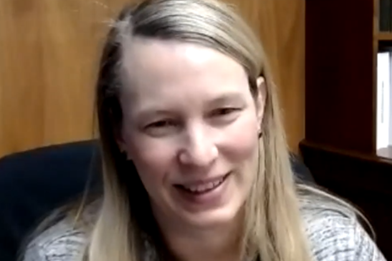
Despite enjoying a record $34 billion budget surplus and prudent reserves from burgeoning but one-time tax revenues, California budget officials expect to see fiscal deficits in the next three years, state Finance Director Keely Martin Bosler told business leaders during a California Chamber of Commerce webinar on January 12.
These projections mean that it is critical to maintain funding reserves if the state wishes to preserve existing programs, and it means that the Legislature should not create new funding obligations, she explained.
“We can’t afford additional ongoing spending at all,” Bosler cautioned.
In fact, California’s strong financial foundation during this pandemic comes from years of building up reserves and paying down debts, she said.
While the state saw more revenue than was expected and drops in the state’s gross domestic product (GDP) have largely recovered, 4 million Californians remain jobless and the COVID-19 pandemic is still ongoing, she pointed out.
Governor Gavin Newsom’s priority, Bosler said, is to respond to the pandemic and create the conditions necessary to accelerate economic and job recovery.
Finance Director Keely Martin Bosler’s webinar presentation.
Early Budget Action
The next budget update will come in May, but Bosler identified a number of items that the Governor would like the Legislature to take immediate action on in the next couple of weeks:
• Safely Reopen Schools—Allocate $2 billion to prioritize in-person instruction;
• Golden State Stimulus—Allocate $2.4 billion to issue $600 refunds to unemployed Californians;
• Small Business Grants—Allocate $575 million in funding to offer grants to small businesses impacted by COVID-19;
• Fee Waivers—Allocate $70 million to grant license fee waivers to restaurants, bars and hair salons impacted by COVID-19-related closures; and
• Allocate $2.6 billion in federal relief funds and extend the eviction moratorium for renters.
Budget Summary
During the webinar, Bosler also gave a preview of the Governor’s proposed budget for the 2021–2022 fiscal year. Below are highlights of her presentation; to view Bosler’s presentation in its entirety, see the video on YouTube.
• Job creation: The Governor’s budget proposes a number of investments in programs to help train workers in areas of need and help create new jobs, including $353 million in apprenticeship programs and programs that link higher education institutions with employers. The budget also allocates $430 million to the CalCompetes program; and proposes tax credits and loans to small and minority-owned businesses.
• Agriculture and infrastructure: To help create infrastructure and construction jobs, the budget proposes $800 million in infill infrastructure grants and deferred maintenance funding to help local governments pay for community infrastructure projects. The budget also grants $385 million to address agricultural needs, such as groundwater management, water efficiency programs and integrated pest management.
• Education: In addition to adding $3 billion to the School Rainy Day Fund deposit, the budget also allocates a record $85.8 billion to Proposition 98 funding, and adds $2 billion in a cost-of-living adjustment to educators.
In addition to $7 billion in new federal funding, the budget proposal seeks $2 billion to help schools reopen safely and $4.6 billion to address the pandemic’s impact on student learning, including summer school and extended school year.
• Wildfires: California saw a devastating wildfire season last year. In response, the budget proposes $1 billion in wildfire and forest resiliency projects to reduce fire risks. Fire departments, the California Conservation Corps, and the California Department of Forestry and Fire Protection (CalFire) will be asked to perform more fire health projects in the wildfire off season, such as thinning brush and forests, and setting prescribed fires. Waste produced from these forest health measures will be offered for commercial use via the Climate Catalyst Revolving Loan Fund.
Lastly, $331 million is proposed to help clean up contaminated properties in impacted communities using health-based criteria.
The Governor’s budget summary is available at http://ebudget.ca.gov/FullBudgetSummary.pdf.



